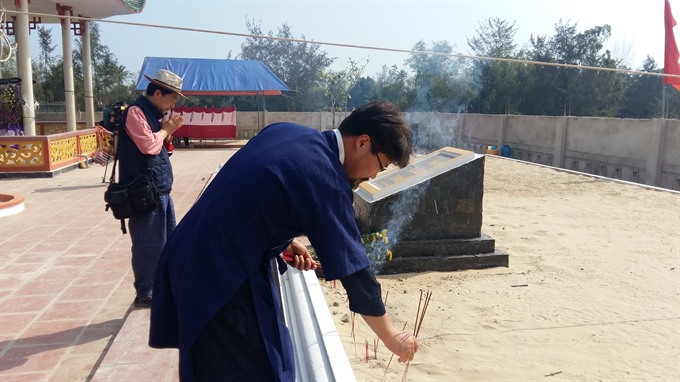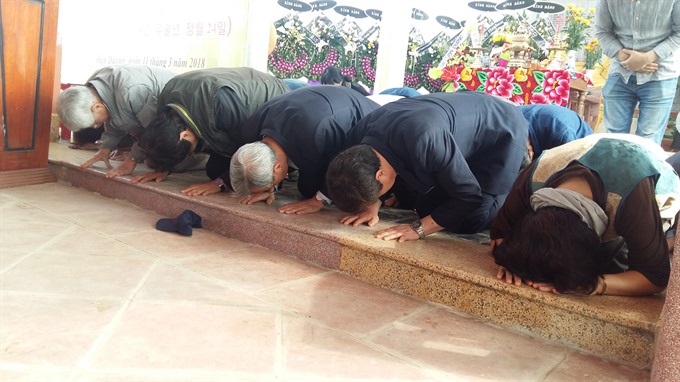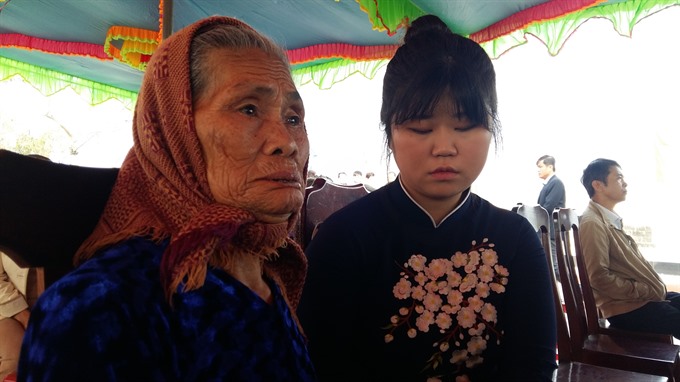 Society
Society
.jpg)
“We say sorry to the Vietnamese people. Please, forgive us, even if our apology is not sufficient for all Vietnamese people and residents of Hà My village.”
 |
| Members of the Korea-Vietnam Peace Foundation visit a mass tomb of Hà My villagers in Quảng Nam Province. — VNS Photo Công Thành |
QUẢNG NAM — “We convey our apology to the Vietnamese people. Please, forgive us, even if our apology is not sufficient for all Vietnamese people and residents of Hà My Village.”
The president of the Korea-Vietnam Peace Foundation, Kang U-Il, gave an emotional speech at an event marking 50 years since a massacre committed by South Korean soldiers in Hà My Tây Village, in the central province of Quảng Nam, on Sunday.
A group of 41 members from the foundation, a member of the Korean National Assembly, Korean writers, organisations, local residents and relatives of victims attended a ceremony and visited the monument dedicated to the massacre in the village.
The killings occurred on the 24th of the first lunar month, 1968, in Hà My Village, when South Korean soldiers attacked and killed 135 unarmed civilians including the elderly and new born babies. The monument records the oldest victim as being 88 years old, while the youngest was just a few months.
“The massacre happened 50 years ago and Vietnamese people have had the chance to heal their wounds. Many Korean people still do not know the truth of the massacre in the village and central Việt Nam. Our hearts break when recalling the killings of Hà My villagers 50 years ago,” Kang U-Il said.
Il, who is a Catholic priest, said he and members of the foundation will tell all Korean people the truth of the massacre, and call for an apology from the Korean people to Việt Nam and villagers of Hà My.
 |
| A group of 41 members of the Korea-Vietnam Peace Foundation express their apologies to Vietnamese people and Hà My Village in Quảng Nam Province on the 50th anniversary of a massacre committed by South Korean soldiers in the village. 135 unarmed civilians were killed. — VNS Photo Công Thành |
Kim Hyun Kwon, a member of the Korea National Assembly, also expressed his emotions when he joined the commemoration for the first time.
“We were anxious and fearful with thought of facing the true story of the massacre. But we want to bravely say ‘sorry’ to the Vietnamese people and victims of Hà My for the killing,” Kim told the media (through an interpreter) in an interview at the ceremony.
“I think that the Korean Government should issue an official apology to the Vietnamese people, and they (Korean Government) need to come to victims of the massacre and say ‘sorry’ to them,” he said.
Kim said he had spent a year preparing and arranging to visit the village.
He said that as a member of the national assembly of Korea, he would call on the Korean Government to apologise to the Vietnamese people.
He said many Korean people asked me to send their apologies to the Vietnamese people before visiting Việt Nam.
Twenty-six wreaths from Korean organisations and individuals, as well as veteran Jeong Gyu Tae, were sent to commemorate the massacre.
Hoàng Thị Thú, 86, a rare survivor of the massacre recalled how she and her two children (one boy and one girl) were attacked by Korean soldiers.
Thú’s left leg was injured by shrapnel from a grenade launched by Korean soldiers during the mass killing on that day.
“It was a bloody day. A peaceful village was shaken by explosions, gunfire and frightened screams. Many villagers were still celebrating after Tết (Lunar New Year) holiday, and they gathered at relatives’ houses, but it’s really a devastating morning for all of us,” Thú recalled in tears.
“That day is still memorialised as an annual anniversary of the deaths of 135 villagers.”
 |
| Hoàng Thị Thú, 88, and Korean Yeo Eun-jong join the commemoration of the 50th anniversary of a massacre in Hà My Vilage. — VNS Photo Công Thành |
Nguyễn Cọi, 74, who managed to escape the massacre by hiding in a tunnel, recalled he heard gunfire and the screams of villagers.
“I could hear gunfire and explosions very clearly from the tunnel. I could not leave my shelter to save relatives as I would have been killed by gunfire,” Cọi recalled.
He said he left the tunnel to find his mother and young brother and sister when everything was quiet later in the evening.
“My mother, my younger brother (seven years old) and aunt were found dead, while my younger sister, Nguyễn Thị Thanh (11 years old) was seriously wounded,” the old man said.
Thanh, who is now 61, managed to recover from her injuries.
Thanh was invited by the Korea-Vietnam Peace Foundation to talk as a victim of the massacre in Korea this April.
An Geon-mo, who joined the commemoration, said his older brother joined the war in Việt Nam as a soldier stationed in HCM City.
“He told me that a group of Korean soldiers (who took part in the massacre) had talked about it. They (Korean soldiers) said they had killed many Vietnamese, but were not sure if they were Vietnamese soldiers or civilians,” An Geon-mo said.
Yeo Eun-jong, who is a university graduate, said she has visited Việt Nam three times, and learned about the massacre during her trips.
“I did not know about the killings by Korean soldiers in Việt Nam, but I paid more visits to join the commemorations in central Việt Nam. I will tell the truth of the killings to Korean people,” Yeo said.
The Korea-Vietnam Peace Foundation, which was established in 1999, aimed to begin a ‘Sorry to Vietnamese people’ campaign among Koreans, and ask for an official apology.
Thousands of people were killed in a series of massacres by Korean soldiers during the war in central provinces of Việt Nam between 1966 and 1971.
In 2015, the Korea-Vietnam Peace Foundation donated 52 items and the ‘Việt Nam Pieta’ statue to Đà Nẵng City’s museum.
The statue commemorated 41 years since the end of the Việt Nam War, and was created to call on the South Korean government to take responsibility for massacres of Vietnamese civilians by South Korean troops during the American War in Việt Nam. — VNS